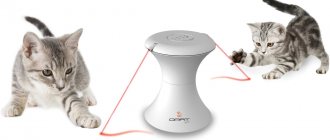When choosing a toy for a furry friend, the owner can rest assured: a laser pointer is a favorite pastime for cats of all ages. And the owners themselves love to watch how deftly the pet jumps after the beam, trying to catch the elusive target. Facts about the dangers of lasers make you wonder whether such a game is harmful. The answer is simple: being careful will turn chasing a speck of light into an exciting and rewarding activity.
How do cats notice lasers?
The glowing dot from the laser pointer attracts the attention of cats. It is important to understand how cats’ vision works and how their eyes differ from human eyes.
The retina is one of the most important parts of the eye that senses light and images. It consists of rods and cones - light-sensitive cells. Sticks help you see well in the dark and twilight, as well as recognize movement. Cones allow us to distinguish colors. Human eyes contain more cones than rods, which is why we see the world in bright colors. There are many more rods in a cat's eyes, so cats detect the slightest movement.
When the owner turns on the laser pointer, the cat has time to notice the movement of the beam with peripheral vision. She does not yet understand that this is prey that can be hunted, but the hunting instinct has already awakened.
Why do cats chase lasers?
June 27, 2019
All cat parents are familiar with the eternal struggle between the cat and the laser pointer. Something nimble and odorless, this little red dot can sure keep a cat energized, despite the fact that she'll never be able to catch it. Interestingly, there is some debate about whether laser pointers are an appropriate toy for our feline friends. So why do cats chase lasers, and is it time to ditch the laser for a different type of toy?
Laser Charm
Lasers are inherently stimulating to cats due to what they are: fast moving prey. Just because your cat doesn't have to work hard for food (unless you count all the effort it takes to meow all morning until you fill her bowl) doesn't mean she's not ready to go.
When a laser dot pierces a room, your cat perceives it as a small animal trying to run and hide. Thus, certain forms of behavior inherent in cats appear, in particular, the innate desire to hunt, pounce and kill the prey that we are talking about. The fact that it's just a projection doesn't really matter because your cat is running on instinct, not intellect.
How cats see lasers
There is another important factor why your cat chases the laser: it simply looks attractive to her. To understand why, it's helpful to have a basic understanding of how cats' eyes work and how they differ from ours.
The retina is one of the main structures of the eye. It is made up of two key cell types: rods and cones. Rods deal with low vision and motion detection, while cones help the eye see color. Human eyes have more cones than rods, which means we are better at seeing colors. Cats, on the other hand, have more rods than cones, making them experts at observing even the slightest movement.
What does this have to do with lasers? This means that they are quite difficult to ignore. The moment you turn on the laser dot for your cat, she will immediately notice it in her peripheral vision. And if she has not yet fully understood that she cannot eat this red dot (and even if she knows that she cannot, she still wants to be!) then this is enough to begin her predatory cycle.
Dispute about cats and lasers
You might be surprised to learn that there is some controversy as to whether laser temptation is a good time for your mustachioed friend, but the debate has been going on for some time.
The main problem noted by laser cat lovers is that having your cat chase the laser is a form of "teasing". Remember, your cat is chasing and pouncing on that red dot because her brain is telling her that it is food to be caught and killed. She doesn't clearly recognize it as a game, even if she's having fun.
The laser is an elusive goal, and no matter how good your cat's hunting skills are, she will never be able to eat it, and she will never end her predatory cycle. Many cats come up with a trick and stop interacting with the laser. Others find this extremely frustrating and may engage in bad behavior as a result. Frustrated cats behave less than ideally, such as becoming destructive or aggressive. If you notice a connection between playing with your cat and the laser and bad behavior, it may be time to put your pointer away for good.
To make laser pointers more fun rather than teasing, give your cat a treat or her favorite toy immediately after playing. This way she will get satisfaction from the "kill" even if it is not the laser itself.
Tips for using a laser pointer
If your cat really enjoys chasing the "restless red dot" and hasn't gotten caught in an endless loop of frustration from that chase, then there's probably nothing to worry about. Chasing a laser is a fantastic way for your cat to get some physical and mental exercise, and also allows her to tap into her cat instincts a bit - something indoor cats don't do as often as they'd like.
Of course, you should still follow proper safety precautions to avoid harming your cat while playing. Here are the two main ones.
Don't shine directly into your cat's eyes. Even toy lasers emit incredibly bright light, so it's important that you don't shine them directly at your cat (or yourself!). Otherwise, you may experience vision problems and/or eye injury.
Provide your cat with plenty of other toys. If the laser is your cat's only option for play, it's more likely that frustration will begin to build. Make sure she has access to plenty of other things to hunt and play with, including catnip toys and foam balls.
Source:
- thesprucepets.com
Is laser dangerous for cats?
Many veterinarians believe that lasers can harm furry pets. By pointing a laser pointer at the kitten, we tease it. He chases the beam like it's prey, not for play, even if he's having fun. A kitten will never catch a laser beam; this is an unattainable goal. A cat will not be able to satisfy its hunting instinct if it catches a luminous beam. Many cats understand this and stop chasing the laser. But others find it very upsetting and may cause them to behave badly. If you notice that your cat has started acting up, you need to stop these games and give her another toy.
In order not to tease the kitten in vain, he needs to be given a treat after playing with the laser. You can replace the treat with a ball or other toy. Thus, the hunting instinct will be satisfied.
Expert opinion
Should you use a laser pointer when playing with your pet? According to experts, such an idea is a kind of teasing. You do understand that he follows the red dot not because he is having fun or wants to play? It is controlled by instinct: it tells your cat to catch this moving prey and deal with it.
To be honest, laser color for your cat is an unattainable goal. Why? Despite his hunting skills, he will never be able to eat that red dot. Essentially, his predatory cycle will remain unfinished.
By the way, after a while, many pets realize this trick and stop being tempted by the laser. This can be very upsetting to other cats, and this can subsequently affect their behavior. Frustration over an unfinished predatory cycle can make your cat aggressive. If you notice this in your pet, stop using the pointer.
How to Protect Your Cat While Playing with a Laser Pointer
It is important to make sure that the cat really enjoys playing with the laser beam and does not get tired of hunting for it. Running like this is a great workout for a kitten. Not only does it provide exercise, but it also trains the cat's natural instincts.
Safety rules must be strictly followed:
- Do not shine the laser into your cat's or yourself's eyes. The laser pointer has a very bright light that can seriously damage your eyesight.
- Give your cat other toys. If he only plays with the laser beam, he will quickly get tired of it and become frustrated.
- A laser pointer shouldn't be your kitten's only entertainment. He needs other toys and treats such as balls, treat sticks and catnip.
Explanation
Lasers by nature stimulate cats by what they represent: in the pet's mind, fast-moving prey. Just because your cat doesn't have to work hard to get food doesn't mean she's completely forgotten about her instincts.
When a bright dot darts around the room, your cat perceives it as a small animal trying to hide from it. In fact, in such a situation, you are observing the manifestation of instinctive behavior: cats “absorbed the desire to catch up and hunt with their mother’s milk.” Although the light from a laser pointer represents a kind of projection of an object, this does not matter to the pet: at this moment it operates on autopilot.
Games with a pointer: harmful or beneficial?
For an active animal, such entertainment is a great way to get rid of excess energy.
If safety rules are properly observed, a laser pointer has practically no disadvantages. Chasing the beam trains reaction speed, attention and agility, and regular exercise keeps the animal in good physical shape. This is especially true for individuals prone to obesity. You can “turn off” your pet’s night mode by playing with it in the evening: a tired cat will sleep peacefully all night and will not bother the owner by running around the apartment. In addition, the pointer will “discharge” and calm an overly violent cat.
The safety of green lasers versus red lasers is a common myth: beams that are too powerful are equally harmful to the retina. However, when choosing a toy for a pet, you should give preference to the first one, since the cat’s eyes react better to green color.
Laser Pointer Safety Tips
Provided your cat is actually enjoying chasing the laser and isn't just caught in an endless loop of hunt-jump-frustration, you probably don't have anything to worry about.
Chasing a laser is a fantastic way for your cat to get some physical and mental exercise, and also allows him to use his instincts a bit, which indoor cats don't do as often as they'd like.
Of course, you still need to follow the correct safety tips to avoid harming your cat while playing.
Don't shine directly into your cat's eyes!
Even toy lasers emit incredibly bright light, so you shouldn't shine them directly at your cat (or yourself!). If you do this, you may cause vision problems/or eye injuries.
How to reduce laser harm
The main problem that breeders and animal psychologists notice is that the animal’s needs are not being met. The animal’s brain and instincts say that this way he will catch something for lunch. The cat does not always understand that this is a game, even if it enjoys the process.
Some cats still recognize the deception and stop paying any attention to the laser. Other purrs feel stressed and frustrated. Over time, many begin to behave badly. For example, they begin to show aggression and damage things in the apartment. If you begin to notice changes in your pet's behavior from playing with a pointer for the worse, it is better to stop such games.
Or you can give your cat treats after these games. This way he will enjoy the hunt without even catching the laser itself.
Video: How big wild cats react to a laser dot
With the advent of laser pointers, many people began to play pranks on their pets. Cats especially often chase the pointer's beam. This toy completely captures the pet’s attention; he follows it around the house, not noticing any obstacles. This is how domestic cats show that they still have predatory instincts. An employee of an organization that rescues and cares for feral cats likes to play with his cat Jack, shooting laser pointer beams around the room. The pet is delighted with the game and chases the red dot everywhere. He decided to check how big wild cats react to a laser beam, whether they are interested in such a game and whether they will even notice this red dot.
The guy waited until dark, took his laser pointer and headed towards the cages where the big cats live: leopards, cheetahs, lynxes, pumas, lions and tigers. The cheetahs were the first to be tested, and they liked such an entertaining game. The cats ran after the laser beam with great pleasure. The video shows cheetahs running after the laser and showing great interest in it. They even stuck their paws out of the cage and tried to reach the point. The lynx also turned out to be interested in the laser beam, and the leopards also liked the game.
Tags
Cats Why do cats chase between a cat and hold a cat why do cats chase your cat not your cat perceives your cat works How do cats see a laser pointer. laser pointers suitable remove the pointer. cat parents are familiar the eyes of cats and for cats the brain of cats produces Cat behavior cats attention. Raising cats Behavior cats Breeds of cats Breeds of cats
breedsfeedarticlesandconesfactmakescommenthomefastcontentshealthyhassticksdiseasesviewonlyworksforminusesprosrecordstreatment
Safety rules during the game
It is best to purchase a low-power device for playing with your pet.
Any game should be approached wisely, because often fun turns into tragedy: losing coordination, the cat is injured, bumping into furniture, falling from a height and causing serious injuries to itself. A laser beam hitting the retina of the eye can result in irreparable consequences, even if done accidentally. To benefit from training and not put your pet at risk, you need to remember a few rules.
- Never point the beam at your pet's face. Even short-term laser exposure is dangerous for the eyes, and regular and intentional exposure will only increase the risk of damage.
- Use a low-power laser. Only ordinary cheap pointers with a power of 1-5 mW are safe for playing with cats. In addition, too bright a beam can scare the animal.
- Do not shine your pointer on mirror surfaces. Reflected laser is just as harmful to vision as direct laser.
- Coordinate the movement of the beam. You shouldn’t randomly turn the flashlight in all directions: when chasing the “target”, not only the cat, but also the interior items will suffer. You should also avoid hitting the wallpaper with the beam - the pet may hit the wall hard with acceleration.
- Do not play near open windows. An angry pet may hit the glass or jump out of the window, so for additional safety it is recommended to install a mosquito net.
Of course, we must not forget about the main motive of entertainment. Chasing a laser spot, cats are not just playing: the animals perceive the process as hunting. To prevent your pet from being disappointed, each time being left without prey, it is important to reward him with a “trophy”: treat him with a treat, cuddle him and praise him. At the end of the game, you can transfer the beam to the ball that the cat usually plays with, or to another favorite object. This motivates the pet to continue playing and helps develop the hunter's talent.
Advantages and disadvantages of laser pointers
The advantages of playing with a laser beam are the indescribable delight that your pet experiences while chasing an elusive moving dot. The cat gets very tired, falls asleep quickly and does not disturb its owners at night. An animal that spends its entire life in an apartment receives physical exercise.
Muscles, ligaments, and the musculoskeletal system work and become stronger. Excess calories are burned, which protects your pet from obesity and chronic diseases.
To prevent the cat from getting tired of the game, it is alternated with others - a wind-up mouse or a fishing rod with a fish at the end. However, thoughtless passion for lasers harms not only the physical, but also the mental health of the cat.
The pet becomes overexcited and may get injured. The unattainability of the goal makes the pet angry; he realizes his inability to catch the will-o'-the-wisp. The cat gets a nervous breakdown and loses interest in games.











